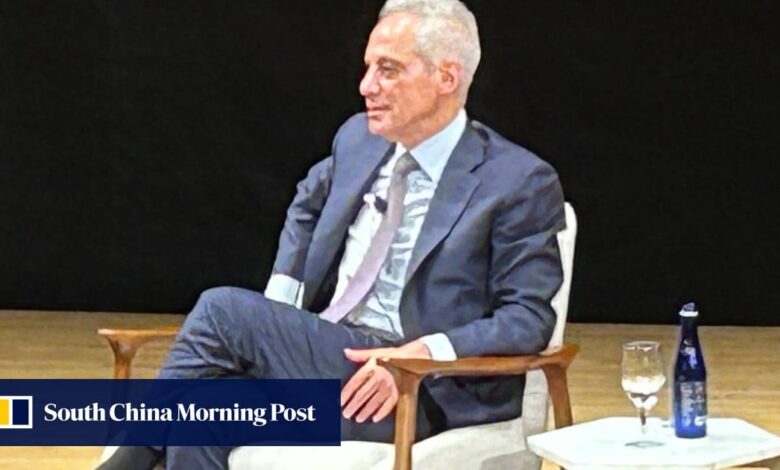US envoy to Japan derides China for its stand on Fukushima waste water release

Rahm Emanuel, the US ambassador to Japan, accused Beijing on Friday of a double standard in its response to the release of Fukushima radioactive waste water into the Pacific Ocean.
“China is fishing in Japan’s waters, based on the public health of Fukushima water, yet refusing to import the same fish that Japan catches in their own,” said Emanuel, who was photographed eating fresh fish during a visit to Fukushima in August.
Emanuel was speaking at an event – briefly disrupted by climate activists – on US-Japan relations organised by Asia Society in New York.
In 2011, Japan narrowly averted catastrophe when the Fukushima Daiichi nuclear plant was struck by an earthquake and tsunami. In August, Tokyo began releasing what it said was treated and safe radioactive water from the plant, which remains shut down, into the ocean.
At the time, Beijing protested against the waste water release and banned all seafood imports from Japan over “safety concerns”. Public demonstrations against the release have occurred in the US and South Korea, and some Pacific Island nations also expressed concerns.
The International Atomic Energy Agency, which approved the release, has begun conducting tests on fish caught nearby and will publish results in the coming weeks. Chinese scientists are members of that team.
Emanuel, who has reportedly irked the White House with snarky social media posts against Beijing in recent months, supported Japan’s actions on Friday, comparing the Fukushima disaster with the outbreak of Covid-19 in Wuhan.
“A dozen years [ago], a horrible incident happened,” he said. “Three years ago, a horrible incident happened, in Wuhan, China – Covid.
China joins mission to test seas, marine life around Fukushima plant
China joins mission to test seas, marine life around Fukushima plant
Japan, he said, “has been fully transparent, invited the international community in and based it on science”.
By contrast, he added, China “did not invite the world” and had been “resisting” the release of information about the pandemic.
Describing Japan as a “responsible international player in the international system” that upholds principles of “transparency, science and accountability”, the envoy blamed Beijing for not cooperating on Covid.
“In the last three years when we’re learning from other countries, what was working, what wasn’t working, and adjusting our policies … You’d like another country, especially where the disease started, to be a little more transparent and participatory on a scientific medically-based process,” he said.
China’s embassy in Washington did not immediately respond to a request for comment.
Japan’s Fukushima water release is a scientific, emotive and diplomatic issue
Japan’s Fukushima water release is a scientific, emotive and diplomatic issue
Saying that “three Cs” – “covid, conflict and coercion” – had “fundamentally” altered the world, Emanuel praised a “very different” Japan, one that in recent years has significantly raised its defence budget and signed a historic security and economic agreement with the US and South Korea.
Emanuel said that the trilateral deal, signed at the US presidential retreat of Camp David in August, had “changed China’s calculations” in the Indo-Pacific.
He further contended that while Washington was receiving some “resistance” in Latin America and Europe over countering China’s coercive behaviour, the Indo-Pacific, especially Japan, welcomed partnership with the US.
“Economically, militarily, diplomatically, politically – because they know an untethered China is a real risk to them and they need America, all of America,” he said.





